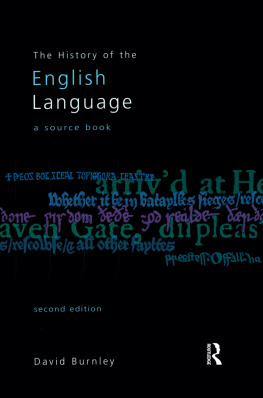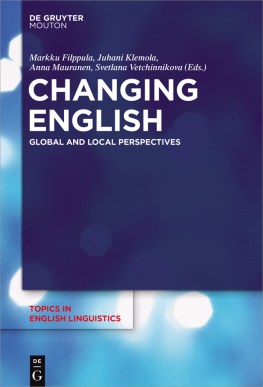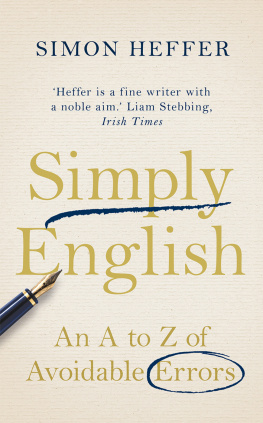Horobin Simon - How English became English: A short history of a global language
Here you can read online Horobin Simon - How English became English: A short history of a global language full text of the book (entire story) in english for free. Download pdf and epub, get meaning, cover and reviews about this ebook. year: 2015, publisher: Oxford University Press, Incorporated, genre: Children. Description of the work, (preface) as well as reviews are available. Best literature library LitArk.com created for fans of good reading and offers a wide selection of genres:
Romance novel
Science fiction
Adventure
Detective
Science
History
Home and family
Prose
Art
Politics
Computer
Non-fiction
Religion
Business
Children
Humor
Choose a favorite category and find really read worthwhile books. Enjoy immersion in the world of imagination, feel the emotions of the characters or learn something new for yourself, make an fascinating discovery.
- Book:How English became English: A short history of a global language
- Author:
- Publisher:Oxford University Press, Incorporated
- Genre:
- Year:2015
- Rating:5 / 5
- Favourites:Add to favourites
- Your mark:
- 100
- 1
- 2
- 3
- 4
- 5
How English became English: A short history of a global language: summary, description and annotation
We offer to read an annotation, description, summary or preface (depends on what the author of the book "How English became English: A short history of a global language" wrote himself). If you haven't found the necessary information about the book — write in the comments, we will try to find it.
Horobin Simon: author's other books
Who wrote How English became English: A short history of a global language? Find out the surname, the name of the author of the book and a list of all author's works by series.
How English became English: A short history of a global language — read online for free the complete book (whole text) full work
Below is the text of the book, divided by pages. System saving the place of the last page read, allows you to conveniently read the book "How English became English: A short history of a global language" online for free, without having to search again every time where you left off. Put a bookmark, and you can go to the page where you finished reading at any time.
Font size:
Interval:
Bookmark:


Great Clarendon Street, Oxford, OX2 6DP, United Kingdom
Oxford University Press is a department of the University of Oxford. It furthers the Universitys objective of excellence in research, scholarship, and education by publishing worldwide. Oxford is a registered trade mark of Oxford University Press in the UK and in certain other countries
Simon Horobin 2016
The moral rights of the author have been asserted
First Edition published in 2016
Impression: 1
All rights reserved. No part of this publication may be reproduced, stored in a retrieval system, or transmitted, in any form or by any means, without the prior permission in writing of Oxford University Press, or as expressly permitted by law, by licence or under terms agreed with the appropriate reprographics rights organization. Enquiries concerning reproduction outside the scope of the above should be sent to the Rights Department, Oxford University Press, at the address above
You must not circulate this work in any other form and you must impose this same condition on any acquirer
Published in the United States of America by Oxford University Press 198 Madison Avenue, New York, NY 10016, United States of America
British Library Cataloguing in Publication Data
Data available
Library of Congress Control Number: 2015952191
ISBN 9780198754275
ebook ISBN 9780191069215
Printed in Great Britain by Clays Ltd, St Ives plc
Links to third party websites are provided by Oxford in good faith and for information only. Oxford disclaims any responsibility for the materials contained in any third party website referenced in this work.
For Jennifer, Lucy, Rachel, and Florence
I am very grateful to Andrea Keegan who commissioned this book and to anonymous reviewers for their incisive comments on previous drafts. I also wish to thank Jenny Nugee, who provided much helpful guidance throughout the writing process. I am grateful to the President and Fellows of Magdalen College, Oxford, for permission to reproduce MS lat. 105, and to Christine Ferdinand and James Fishwick for their assistance. This book has benefited from the insights and advice of numerous friends and colleagues; in particular I wish to thank Deborah Cameron, who read the entire book in draft and made many helpful suggestions, Lynda Mugglestone, Charlotte Brewer, Jeremy Smith, David Crystal, Tim Machan, and Seth Lerer. I am also grateful to my students, especially Lucy Diver, Rosie Durkin, John Phipps, Molly Janz, Alice Richardson, Luc Rosenberg, Jack Solloway, Alice Theobald, and Alice Troy-Donovan, for many fruitful discussions of the issues raised here while I was writing this book. I alone remain responsible for the opinions and for any inaccuracies that remain.
ENGLISH. adj.
Belonging to England; thence English is the language of England.
Samuel Johnson, Dictionary of the English Language (1755)
Samuel Johnsons straightforward identification of English as the language of England hardly begins to capture the diversity and complexity of the languages use in the twenty-first century; English today is spoken by approximately 450 million people all over the world. But the language used by its many speakers varies, in pronunciation, spelling, grammar, and vocabulary, to such an extent that it seems necessary to ask whether these people can all be considered to be speaking English. Even more people speak English as a second language, with figures varying from 1 billion to 1.5 billion people, and with considerably greater levels of linguistic divergence. Are all these people speaking the same language, or are we witnessing the emergence of new Englishes? Since more than half of the worlds native English speakers live in the USA, we might wonder whether the balance of power has shifted such that to speak English today is to speak General American rather than Standard British English. Does English no longer belong to England, as Dr Johnson confidently claimed, but rather to the USA, or to everyone who wishes to employ it?
English has been in use for 1,500 years; during that time it has changed to such an extent that the form of the language used by the Anglo-Saxons is unrecognizable to contemporary English speakers. Today we refer to this language as Old English, but should we perhaps think of it as a different language altogether? Modern Italian is descended from the Latin spoken by the Romans, but these are considered to be different languages. Might that not also be true of Old English and Modern English?
The following sections contain five different translations of the same passage from the New Testament (Luke 15: 1116). Despite being very different, each of these has a claim to represent a kind of English. But are they all forms of English, or different languages in their own right? What criteria should we apply when attempting to make such distinctions?
He cw: solice sum man hfde twegen suna. a cw se yldra to his fder; Fder. syle me minne dl minre hte e me to gebyre: a dlde he him his hte; a fter feawa dagum ealle his ing gegaderude se gingra sunu: and ferde wrclice on feorlen rice. and forspilde ar his hta lybbende on his glsan; a he hig hfde ealle amyrrede a wear mycel hunger on am rice and he wear wdla; aferde he and folgude anum burhsittendan men s rices a sende he hine to his tune t he heolde his swyn; a gewilnode he his wambe gefyllan of am biencoddun e a swyn ton. and him man ne sealde.
Given how different the language of this extract is from Modern English, you may be wondering how it could be considered a form of English at all. It is taken from a translation into Old Englishthe scholarly term that refers to the language used by the Germanic tribes who invaded and settled in Britain in the fifth century ad up to the Norman Conquest in 1066. But, while its vocabulary may appear quite unrelated to that of Modern English, this is in part the consequence of a different spelling systemincluding the letters thorn, ash, and eth, which are no longer used in English. If we look closely, we can spot a number of familiar words, such as sunu, fder, and tune, which are the ancestors of Modern English son, father, and town. Other words are harder to recognize, but are nevertheless demonstrably the root of the Modern English equivalent: mycel much, twegen two, dl dole. All of these are English words, yet their spellings and pronunciations have changed so that we no longer immediately recognize them as such.
In other cases, it is not just the spelling and pronunciation that have changed. The word sylle is the origin of our Modern English word sell, but here it means give; similarly, wambe is Modern English womb, but here it refers to the stomach. If we turn from the lexical, or content, words in the passage to its grammatical itemsprepositions, pronouns, and conjunctionswe find that many are identical to their Modern English equivalents: he, him, his, me, and, to. But, despite these clear correspondences, this Old English extract remains significantly different from Modern English, to the extent that contemporary speakers of English are unable to read it without special study.
And hee said, A certaine man had two sonnes: And the yonger of them said to his father, Father, giue me the portion of goods that falleth to me. And he diuided vnto them his liuing. And not many dayes after, the yonger sonne gathered al together, and tooke his iourney into a farre countrey, and there wasted his substance with riotous liuing. And when he had spent all, there arose a mighty famine in that land, and he beganne to be in want. And he went and ioyned himselfe to a citizen of that countrey, and he sent him into his fields to feed swine. And he would faine haue filled his belly with the huskes that the swine did eate: & no man gaue vnto him.
Font size:
Interval:
Bookmark:
Similar books «How English became English: A short history of a global language»
Look at similar books to How English became English: A short history of a global language. We have selected literature similar in name and meaning in the hope of providing readers with more options to find new, interesting, not yet read works.
Discussion, reviews of the book How English became English: A short history of a global language and just readers' own opinions. Leave your comments, write what you think about the work, its meaning or the main characters. Specify what exactly you liked and what you didn't like, and why you think so.

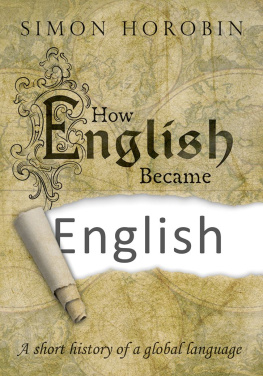

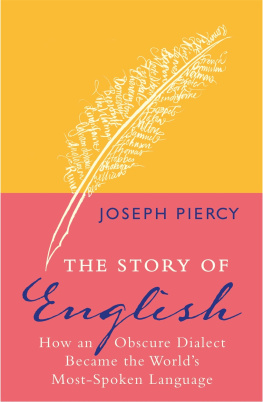
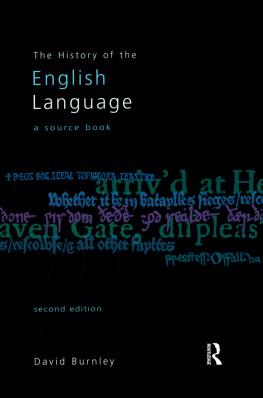
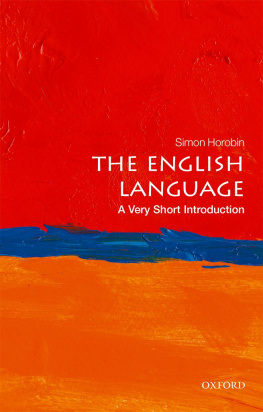
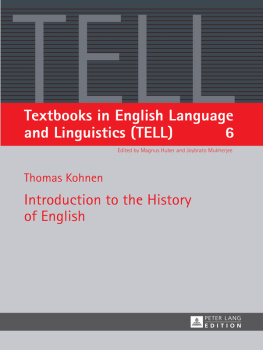
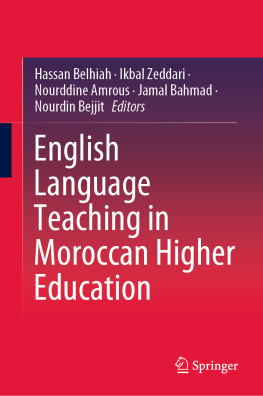
![Bhattacharjee Sudakshina - Improve your global business english: [the essential toolkit for writing and communicating across borders]](/uploads/posts/book/205847/thumbs/bhattacharjee-sudakshina-improve-your-global.jpg)
